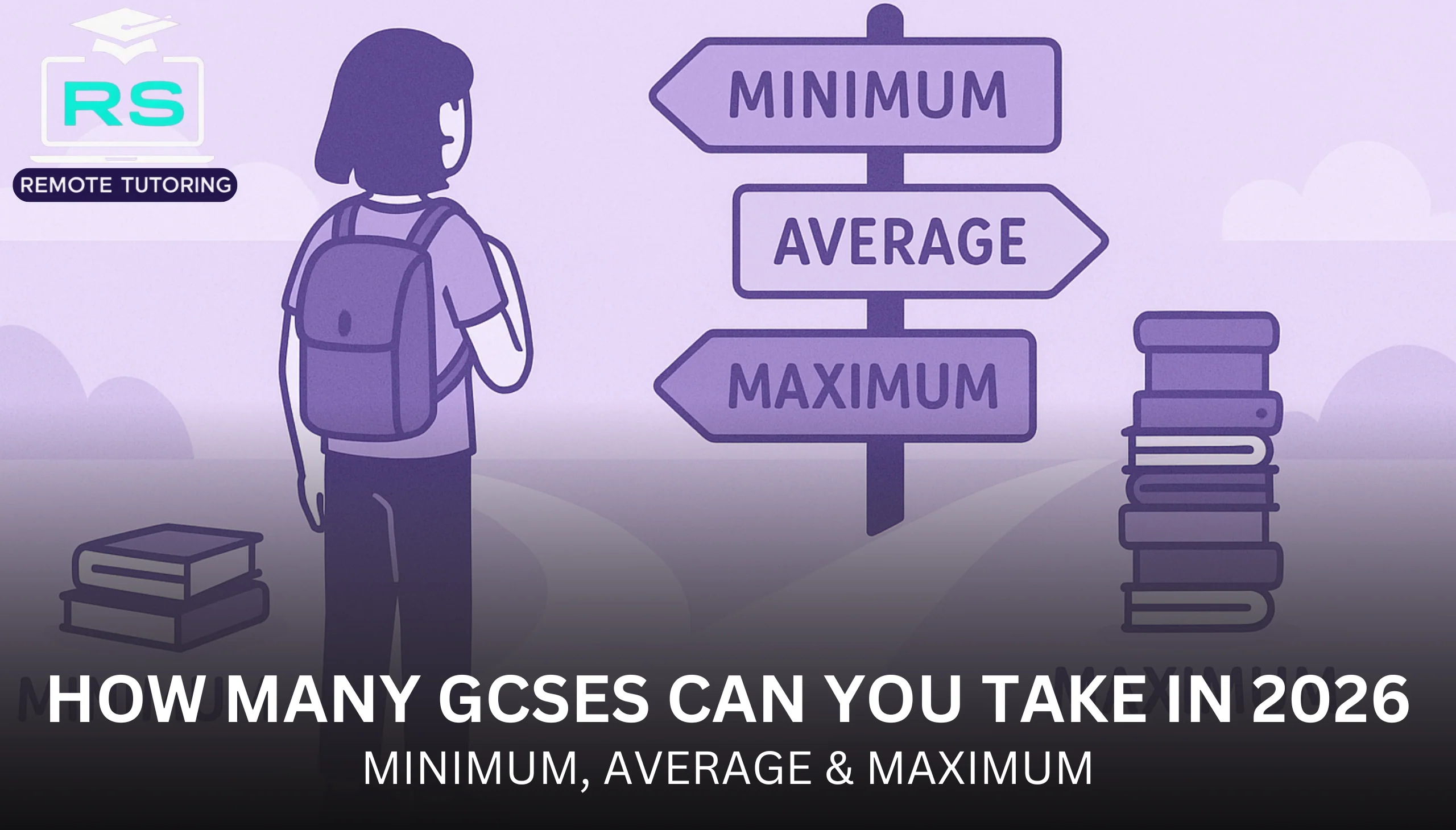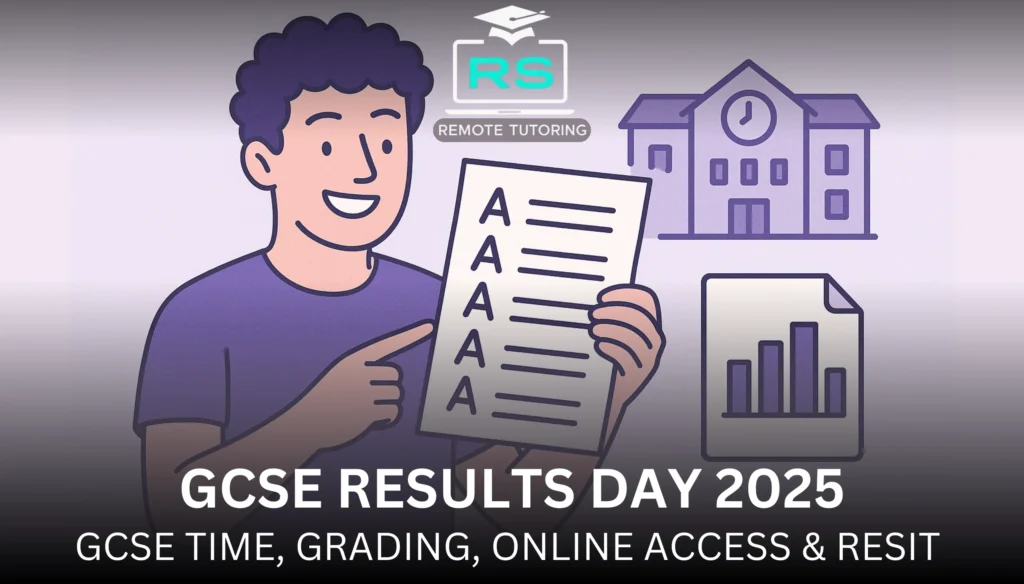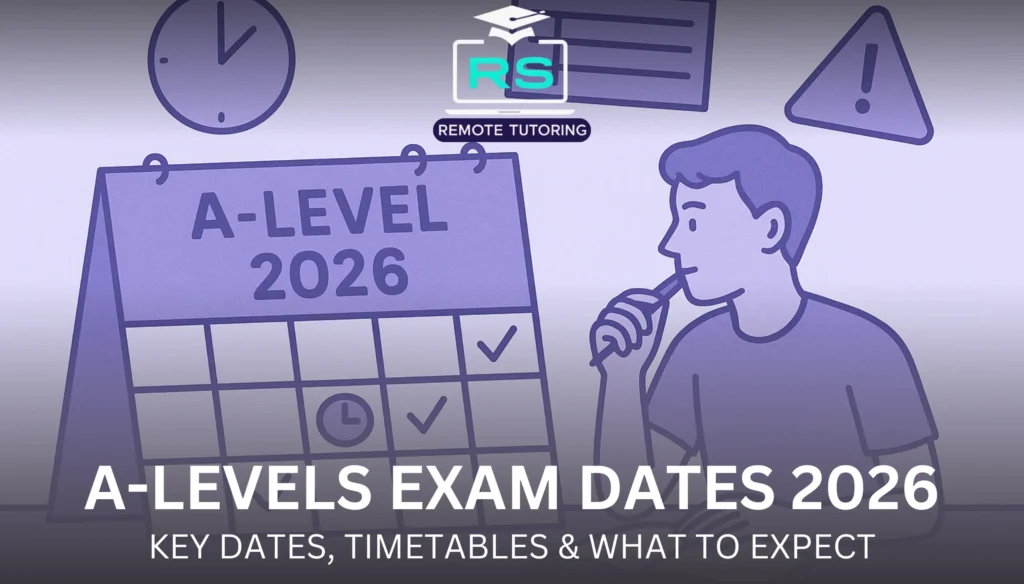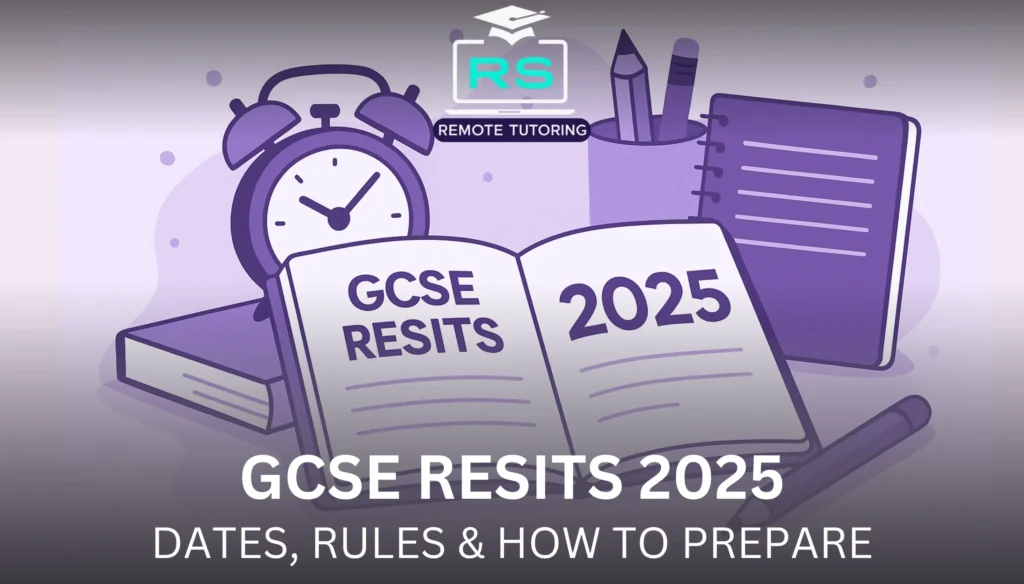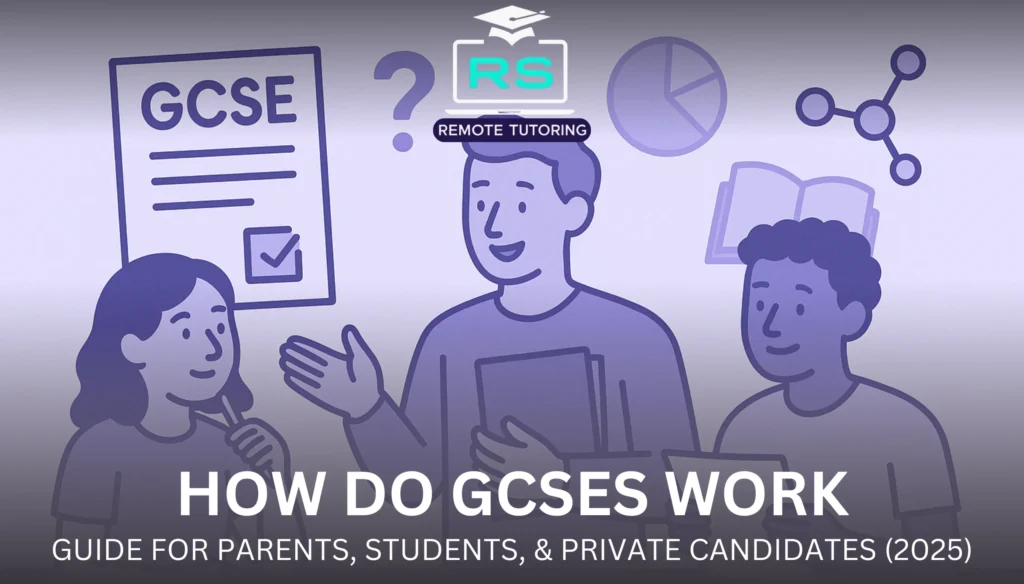General Certificate of Secondary Education (GCSE) qualifications are the gateway to further education and employment in the UK. They mark the end of Key Stage 4, usually in Year 11, and they are an important measure of the knowledge and skills pupils have acquired. As parents and students plan for GCSEs in 2026, one of the most common questions is: “How many GCSEs can you take?”
This guide answers that question in detail, clarifying the minimum number, the average range, and the upper limits, while also offering guidance on how to choose the right mix of subjects. We explore compulsory subjects, optional courses, exam board differences, and the impact of your future goals on your subject choices. We also consider practical constraints like workload, wellbeing and school policies, and provide examples to help you decide what’s realistic for you. Throughout, we draw on official guidance and advice from educational bodies to ensure our information is accurate and up‑to‑date.
Tip for skimmers: If you only have a minute, jump to the sections on the minimum number of GCSEs, the average range, and the maximum load to get a quick overview.
Jump To Section
What Are GCSEs and How Many GCSEs Can You Take?
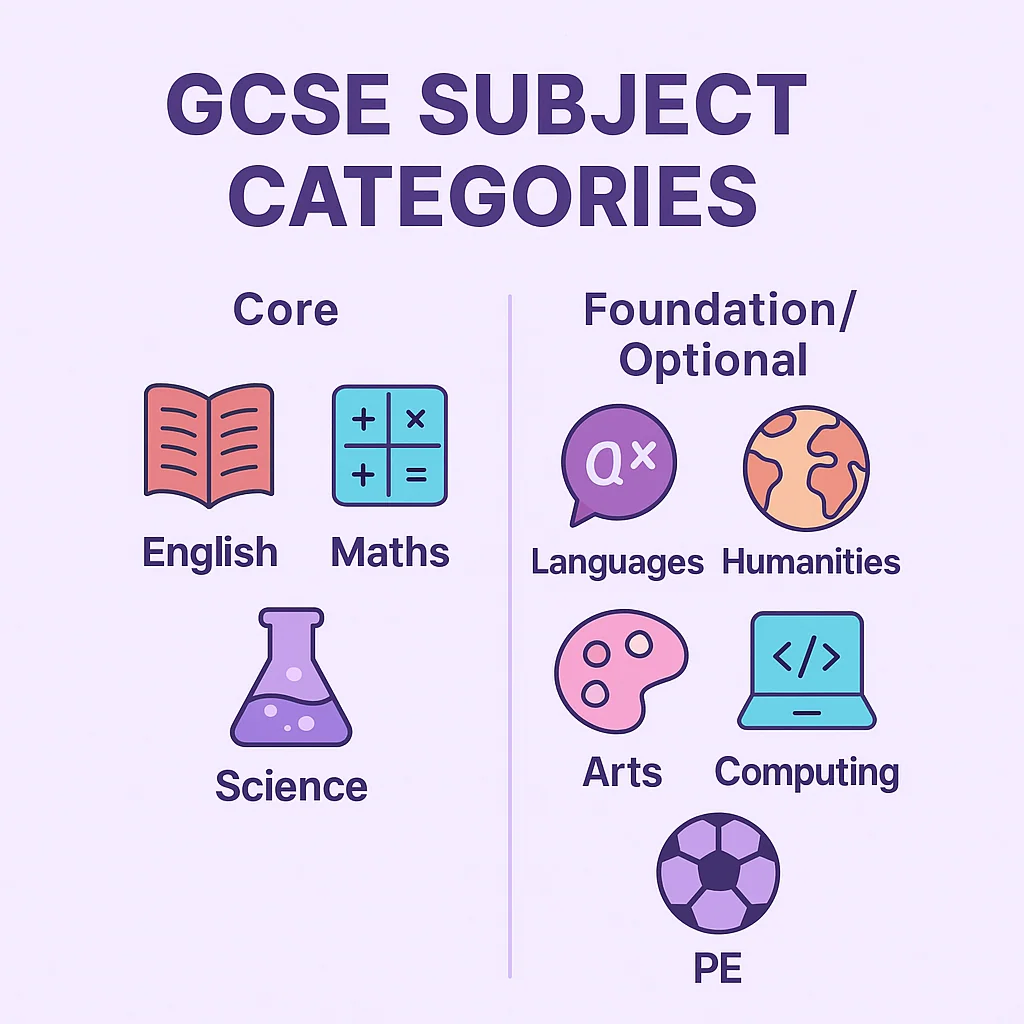
GCSEs are Level 2 qualifications taken mainly by students aged 15–16. They serve three key purposes:
- Assessment of learning: GCSEs evaluate what students have learned in Key Stage 3 and Key Stage 4 across a range of subjects. Some schools also offer courses like triple science (separate Biology, Chemistry and Physics) or combined science.
- Gateway to further study: Many post‑16 pathways, A‑levels, T‑levels, BTECs and apprenticeships, require a minimum number of GCSE passes, especially in English and Maths.
- Foundation for employment: Employers value GCSE results as evidence of literacy, numeracy and discipline. Having a solid set of GCSEs can open doors to job opportunities, apprenticeships and vocational training.
Core vs Foundation Subjects
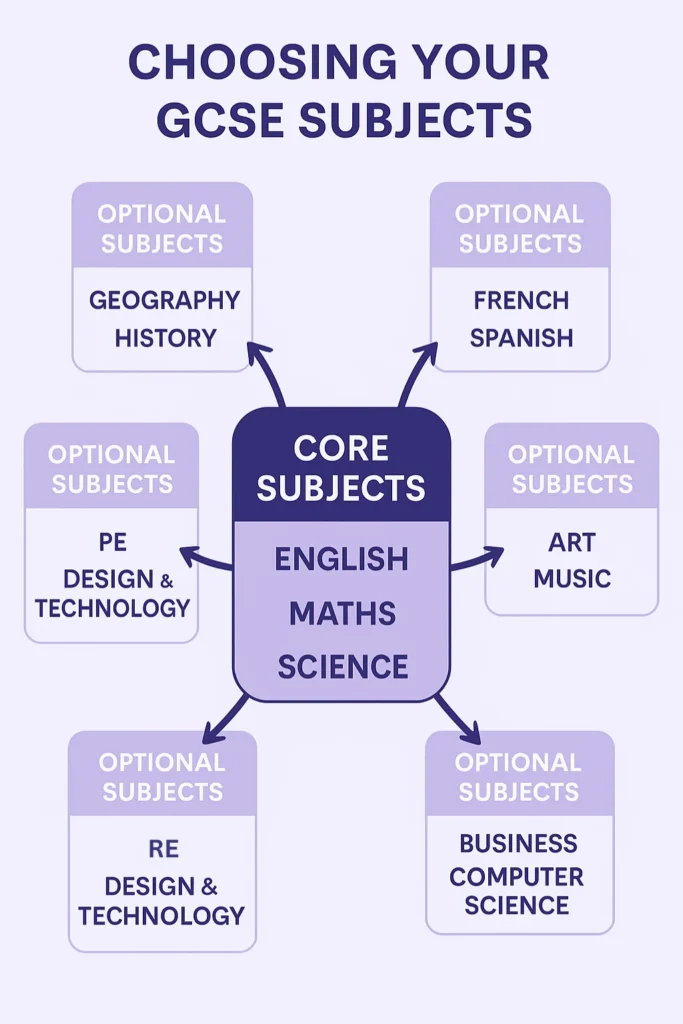
The national curriculum divides GCSE subjects into core subjects and foundation (or optional) subjects:
- Core subjects (compulsory for all students) include English Language, Mathematics and Science (either Combined Science or Triple Science). Some schools also require English Literature and Welsh (in Wales).
- Foundation (optional) subjects include humanities, languages, arts, design & technology, computing, physical education, and more. Students choose from these based on their interests and future goals.
Note: Many schools encourage pupils to take at least one subject from each of the following groups: humanities (History, Geography), languages (French, Spanish, German), creative/technical (Art & Design, Music, Design & Technology, Computer Science), and religious or citizenship studies. These broad categories provide a balanced GCSE curriculum and keep options open for later studies.
Minimum Number of GCSEs
While there is no statutory minimum, there are practical limits. Five GCSEs including English, Maths and Science are generally considered the minimum needed to progress to A‑levels and post‑16 study. Taking fewer than five could restrict options for further education and employment.
Some schools insist that students also take English Literature and a language or humanity, meaning the realistic minimum could be seven. For example, one Reddit student explained that their school mandated Mathematics, English Language and Literature, Combined Science, a modern language and Religious Studies, plus either History or Geography, before adding any options. Another student had Combined Science, Maths, both English courses, and one humanity as core, then had three choices. These examples illustrate that minimums vary by school, but the idea remains: Core subjects plus a handful of electives.
Why Not Fewer?
- Entry requirements: Sixth forms and colleges typically require passes in at least five GCSEs to admit students.
- Future flexibility: With only a few GCSEs, you may find it harder to switch courses or pursue a competitive university programme later.
- Employability: Employers often expect passes in English and Maths. Taking only three or four GCSEs might leave you without these essential qualifications.
Average Number of GCSEs
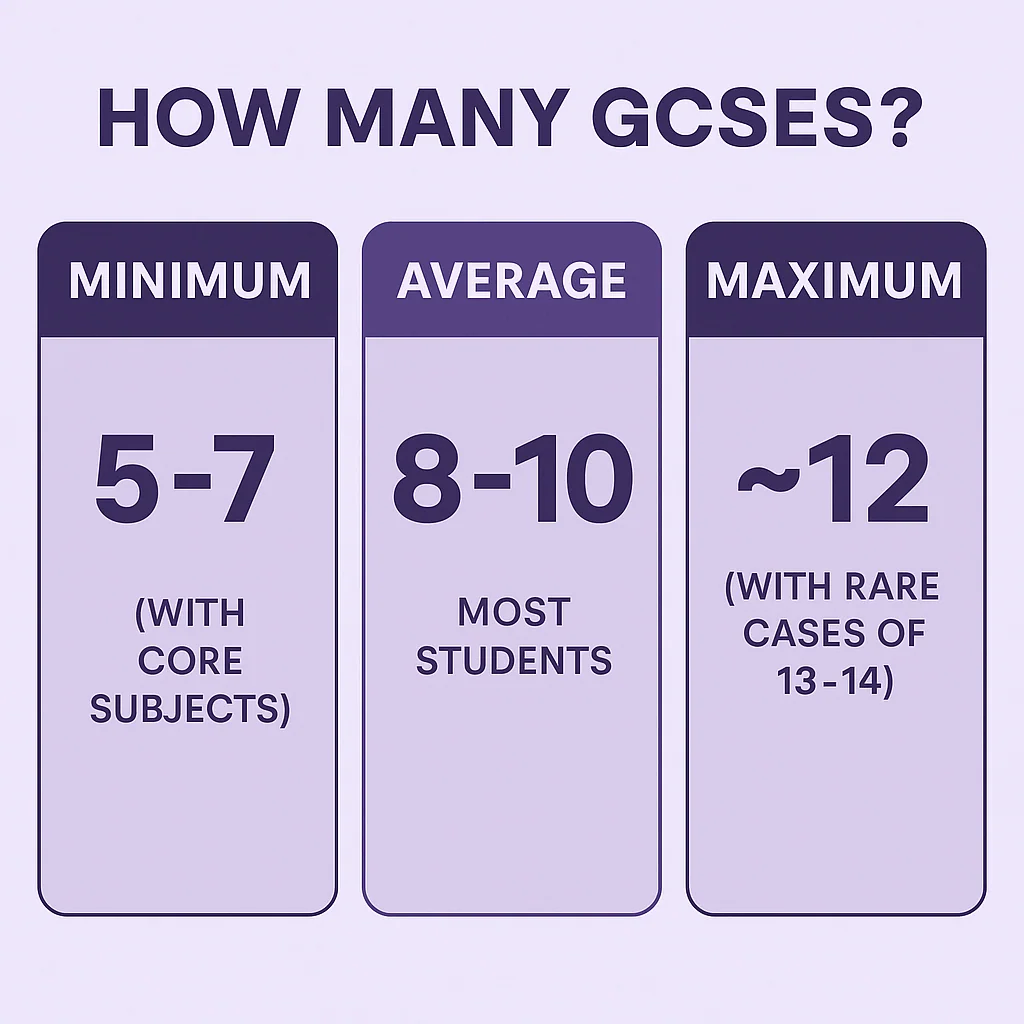
Most students in the UK take between eight and ten GCSEs. This range appears repeatedly across reputable sources. There is no set number but students typically take between seven and ten subjects and that schools usually cap the total at around 12.
Why Do Students Take 8–10 GCSEs?
- Breadth and depth: Choosing around nine subjects ensures coverage of the core while allowing room for personal interests. For example, a student aiming to study STEM subjects may choose Triple Science, Maths, a modern language and a technology subject (like computer science). Another student with humanities interests might take History, Geography, Religious Studies and a language to complement core subjects.
- University preparation: Competitive universities often look for a robust set of GCSEs, usually around eight or more with strong grades. While grades matter more than sheer number, having a broad profile demonstrates capability.
- Flexibility for A‑levels and beyond: With eight to ten GCSEs, students can pivot between academic and vocational routes. Those who plan to pursue arts may include Art & Design or Music; those leaning towards sciences might take Physics, Chemistry or Biology individually.
Maximum Number of GCSEs
Technically, there is no national limit on the number of GCSEs you can take. The Joint Council for Qualifications does not impose a maximum. However, school timetables and workload considerations create a practical cap. While there’s no formal limit, “the suggested maximum is 12” because beyond that, the heavy study load can increase the risk of failure so schools often set a limit “around 12 GCSEs”.
Some students go beyond the average, there are cases of high achievers taking 13–14 GCSEs by starting some early (in Year 10) or studying non‑timetabled subjects after school, such as Further Maths or Classical Greek. However, such cases are exceptional and typically require strong study skills and supportive schools.
Considerations When Taking Many GCSEs
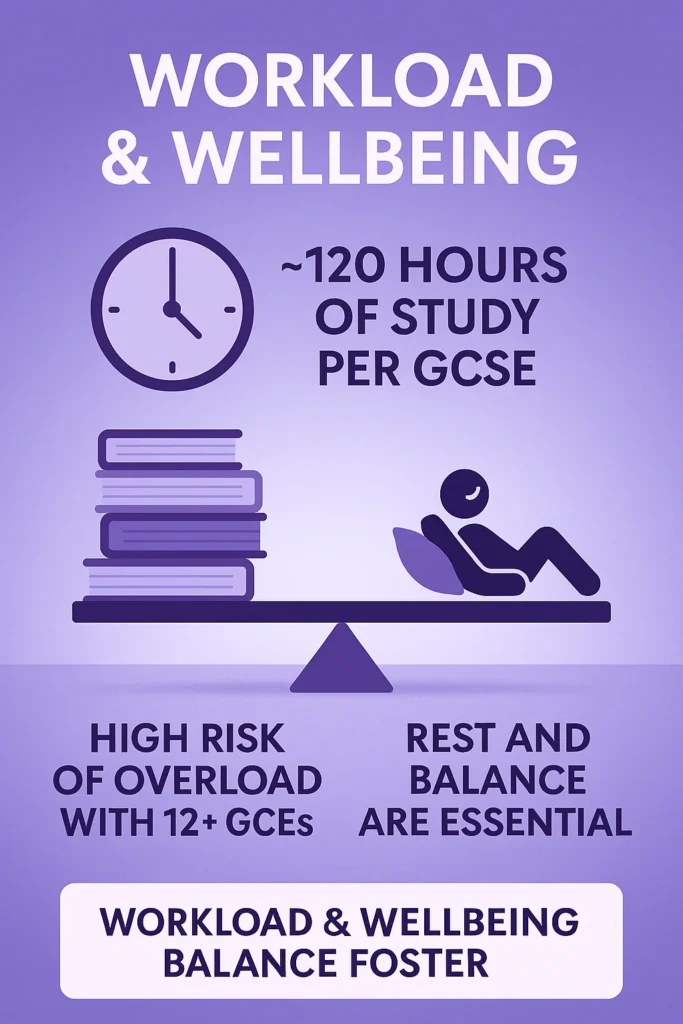
- Time commitment: Experts estimate students should spend around 120 hours revising for each GCSE subject. Taking more than 12 could mean over 1,400 hours of study, leaving little room for extracurriculars or downtime.
- Stress and wellbeing: More subjects mean more exams and potential stress. Taking too many can harm mental health and lead to burnout.
- Diminishing returns: Admissions tutors rarely reward quantity over quality. High grades in a sensible set of subjects are more valuable than mediocre results across a sprawling list. As the Oxford Scholastica Academy warns, focusing on a manageable number helps students secure top grades.
Case Study: Doing 12+ GCSEs
Some schools allow students to do extra subjects like Further Maths in Year 10 or after school. One Reddit user described taking 14 GCSEs, including early entries and extras. While they managed, they acknowledged it required long hours and a high workload. In most cases, 12 is considered the upper practical limit.
Core and Optional GCSE Structure
Understanding how GCSEs are structured helps you plan your portfolio. Schools usually categorise subjects as follows:
Core GCSE Subjects
- English Language (Mandatory everywhere)
- English Literature: Considered a core subject in many schools, though technically optional.
- Mathematics: Compulsory and essential for most careers.
- Science: Offered as Combined Science (two GCSEs) or Triple Science (three GCSEs: Biology, Chemistry, Physics).
Optional GCSE Subjects
Optional subjects vary by school, but they often include:
- Languages: French, Spanish, German, Italian, Urdu, Punjabi or others.
- Humanities: History, Geography, Religious Studies.
- Creative and Performing Arts: Art & Design, Music, Drama, Textiles.
- Technology and Computing: Design & Technology, Food Technology, Computer Science.
- Business and Social Sciences: Business Studies, Psychology, Sociology, Economics.
- Physical Education.
Some schools also offer vocational or technical courses (e.g., BTECs) that are equivalent to one or more GCSEs. Students may substitute a GCSE with a BTEC in Business or Health and Social Care. These still count toward the total number of qualifications.
How Schools Determine Your GCSE Pathway
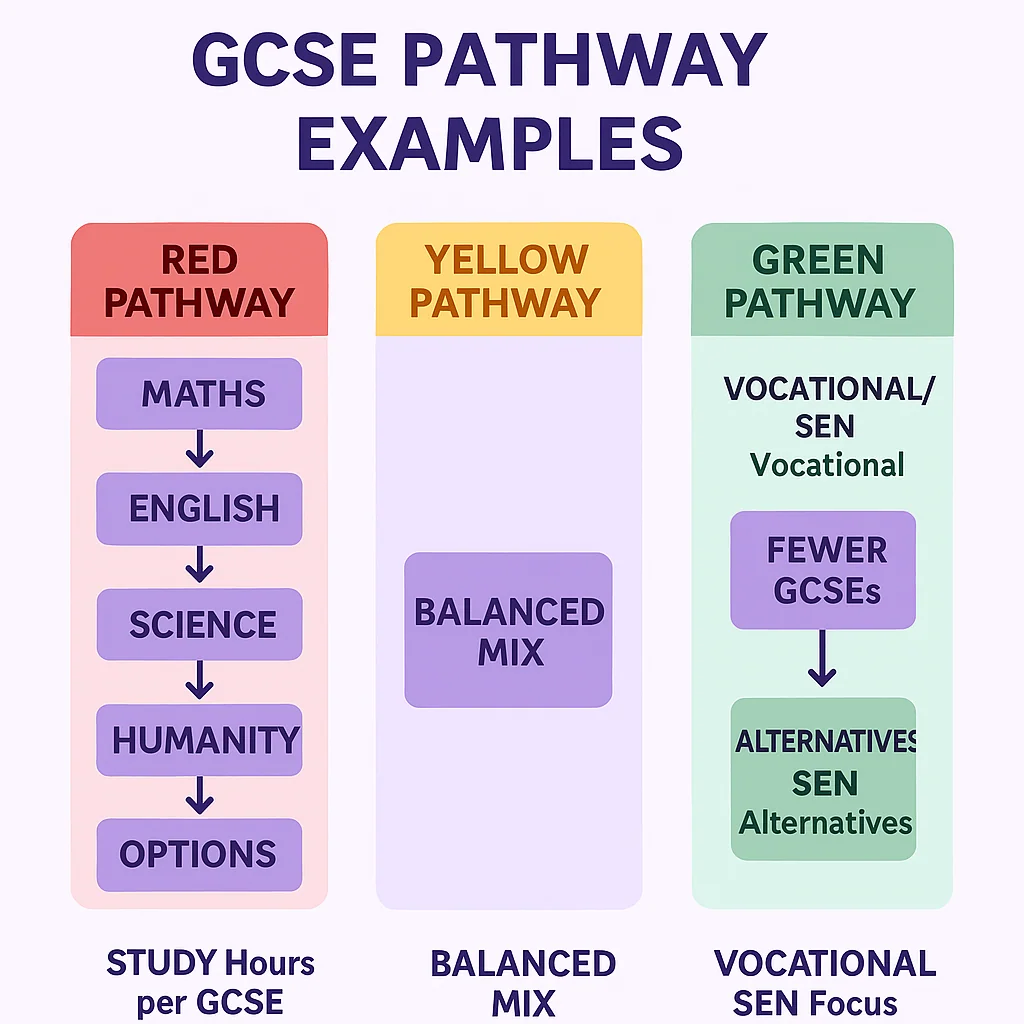
Different schools use different pathways or options blocks to structure GCSE choices. Examples include:
- Red Pathway: mandatory subjects (Maths, English, Science) plus one humanity (History, Geography or Computer Science), one language, and three options, common in academically rigorous schools.
- Yellow Pathway: a broader selection with combined science and fewer compulsory subjects, giving students more freedom.
- Green Pathway: often for students with special educational needs or those focusing on vocational courses; may reduce the total number of GCSEs and include alternative qualifications like functional skills.
Schools typically hold options evenings in Year 9 where students and parents can ask questions and explore course combinations. Always check your school’s specific guidelines because option blocks, teacher availability and timetable restrictions will influence the subjects you can take.
Factors to Consider When Deciding How Many GCSEs to Take
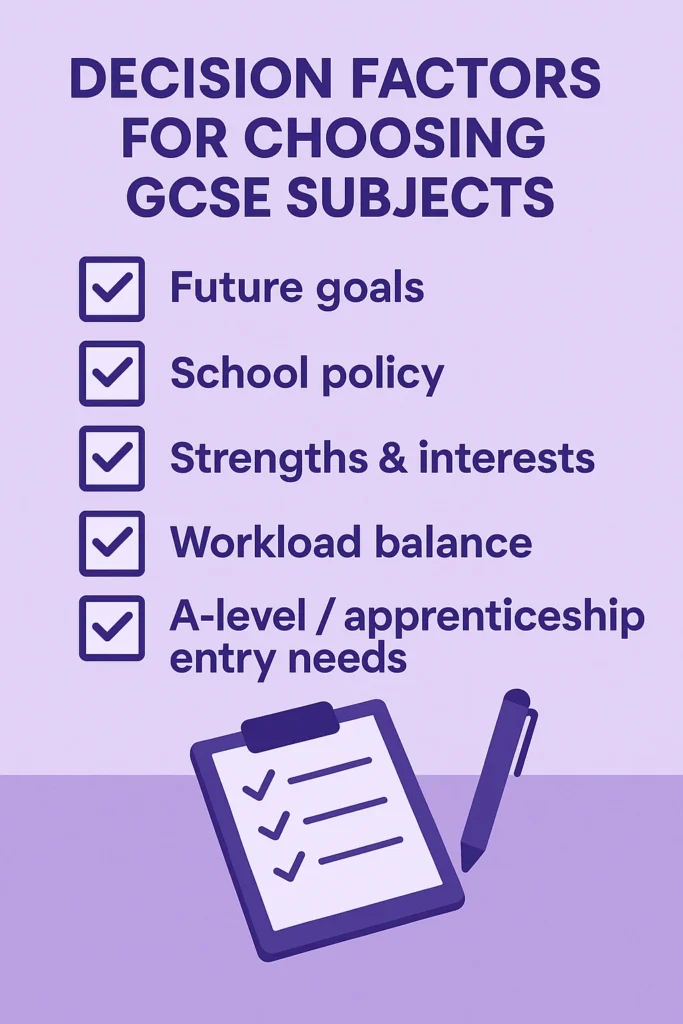
1. Future Goals
- A‑level and university plans: If you aim for competitive A‑levels or universities, you will need strong GCSE grades in relevant subjects. Students aiming for medicine, for instance, usually need high grades in Biology, Chemistry, Physics and Maths.
- Vocational routes: If you plan to move into an apprenticeship or vocational course, focus on achieving high grades in core subjects plus related options. Some apprenticeships accept applicants with two GCSEs (English and Maths), but more GCSEs can broaden your choices.
2. School Policy and Resource Availability
Schools often set a range (e.g., 9–12 GCSEs) to ensure timetabling works. Additionally, not all schools offer every subject. You may wish to study Latin or Computer Science, but if your school doesn’t provide it, you might have to take it privately or online. Also note that some schools combine science into double award or offer triple science only for top sets.
3. Personal Interest and Strengths
Choose subjects you enjoy and are good at. Passion drives motivation; it’s easier to revise for subjects you find interesting. If you love literature, take both English Literature and a foreign language. If you’re more technical, consider Computer Science or Design & Technology.
4. Workload and Wellbeing
Balance is crucial. Each GCSE requires time for coursework, revision and exams. Overloading yourself can lead to stress and lower grades. Ask yourself
- How much time can I dedicate to study? Remember the estimated 120 hours per subject.
- Do I have extracurricular commitments? Sports, music or part‑time jobs require time too.
- Am I prepared for exam pressure? Taking more subjects means more exams over May–June. Consider your resilience and mental health.
5. Alternative Qualifications
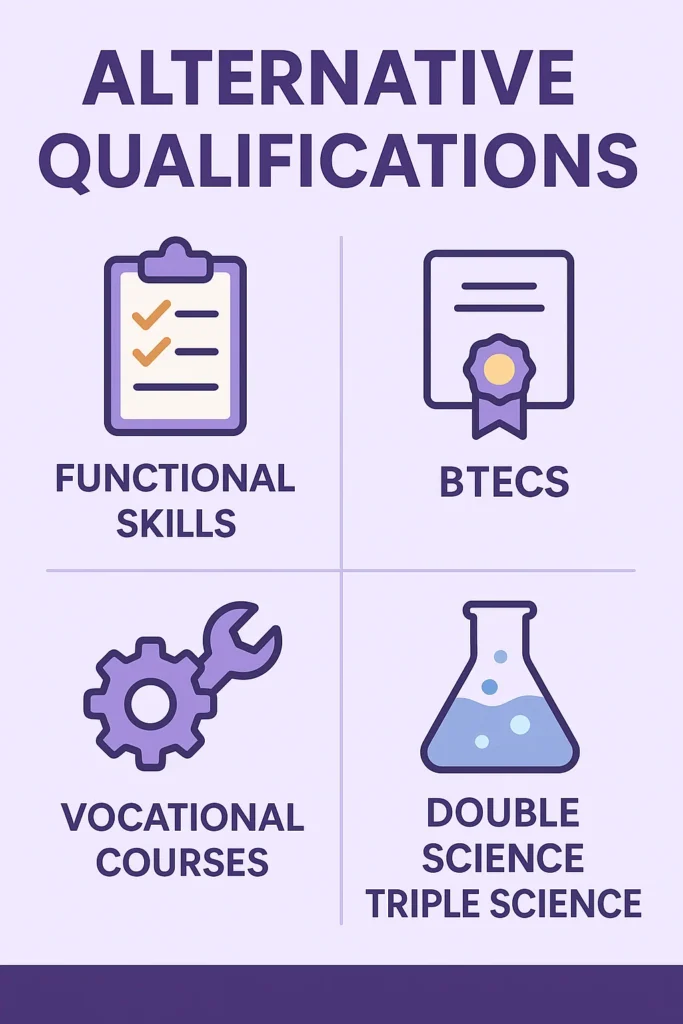
Don’t forget that some subjects count as more than one GCSE. For example, Combined Science awards two GCSE grades, while Triple Science yields three. Similarly, there are vocational courses and functional skills that may be more appropriate if you struggle with traditional academic subjects.
Frequently Asked Questions (FAQs)
Can you really take as many GCSEs as you want?
Technically yes, there is no official cap. However, your school will set a sensible maximum, often around 12 due to timetabling and workload. Choosing more than 12 is rare and may jeopardise your wellbeing and grades.
What is the minimum number of GCSEs needed to enter sixth form or college?
Most sixth forms and colleges require 5 GCSE passes, including English and Maths. Some courses specify particular subjects (e.g., A‑level Biology may require a good grade in GCSE Biology or Combined Science). Always check entry requirements.
Q3: How many GCSEs do you need for university?
Universities look at A‑levels first, but strong GCSEs are also important. Many universities expect at least 5 GCSEs including English and Maths, while competitive courses may ask for higher grades and specific subjects. For Oxford or Cambridge, candidates often have eight or nine GCSEs with grades 8–9. Consult your target universities for specific guidance.
Can you take a GCSE in Year 10 or earlier?
Yes. Some schools allow high‑achieving students to sit a GCSE early. For example, you might take Further Maths or Religious Studies in Year 10. This spreads the exam load and creates room for extra subjects in Year 11. However, early entry means you must be fully prepared sooner and may need to revise while learning new topics in Year 11.
Do online GCSE courses count the same as school‑based GCSEs?
Yes. GCSEs taken through accredited online providers or through private exam centres carry the same recognition. You can still sit the same exams and receive the same qualification. Online learning can be ideal for subjects not offered by your school or if you require a flexible schedule.
How many GCSEs are needed to be a doctor or engineer?
Specific course requirements vary. Generally, medical schools require strong grades in Maths, English, Chemistry and Biology at GCSE level plus high A‑level results. Engineering courses value Maths, Physics and possibly Computer Science. Aim for at least eight GCSEs including these key subjects.
Planning Your GCSE Portfolio for 2026
Step 1: Understand Your School’s Options Blocks
Attend your school’s options evening, examine the option blocks and note any compulsory selections. If your school requires a language and a humanity, plan accordingly. Knowing the structure prevents last‑minute disappointments when you discover your preferred subjects clash.
Step 2: Clarify Your Goals
Ask yourself where you want to be in the next five years. Are you aiming for sixth form, university, an apprenticeship or direct employment? For example, students interested in computing should prioritise computer science, while future engineers might choose Physics and Mathematics. If you love reading and debate, consider English and Religious Studies.
Step 3: Balance Core and Passion Subjects
Ensure you meet the core requirements: English Language, Mathematics and Science. Add subjects that spark your interest maybe maths, science, or even religious studies if you enjoy philosophical debate. Don’t choose subjects solely because friends are doing them or they’re considered “easy.” You’re more likely to excel where you have enthusiasm.
Step 4: Check Entry Requirements for A‑levels/Apprenticeships
Look up entry criteria for the A‑levels, BTECs or apprenticeships you’re interested in. For instance, A‑level Computer Science typically requires a good grade in GCSE Computer Science or strong maths skills. University courses may require certain GCSEs, medicine often demands grade 6–7 in Maths, English and Science.
Step 5: Create a Study Schedule
Once you know how many subjects you’re taking, plan your revision. Factor in the recommended 120 hours per subject. Spread your revision over months rather than cramming last minute. Include rest days and time for hobbies to maintain balance and reduce burnout.
Step 6: Seek Support When Needed
Family and friends: A supportive home environment helps maintain motivation. Celebrate small victories and share your progress with family or friends to stay accountable.
Advantages and Disadvantages of Taking More GCSEs
Advantages
- Wider knowledge base: More subjects mean more knowledge and skills.
- Flexibility in future choices: Additional GCSEs give you a broader foundation if you change your academic or career plans later.
- Demonstrates academic strength: A larger number of GCSEs (with strong grades) can signal diligence and ability to universities and employers.
Disadvantages
- Higher workload and stress: Each extra subject increases workload and exam stress. The 120‑hour study guideline means sacrificing other activities.
- Potential for lower grades: Overloading can lead to lower marks across the board. Admissions tutors prefer fewer subjects with higher grades.
- Limited by school resources: Schools may not offer all subjects or have capacity for large numbers. Private study requires extra time and cost.
Off‑Topic but Helpful Resources
- Mindfulness techniques: Practising mindfulness can reduce exam stress. See this guide to mindful breathing for quick exercises you can do during study breaks.
- Time‑management strategies: Read about Pomodoro Technique to manage revision sessions and stay focused.
- Improving sleep habits: Sleep is crucial for memory consolidation and wellbeing. Learn how to build a better sleep routine for students.
These resources won’t teach you GCSE content, but they will help you manage the process and perform at your best.
Conclusion
In summary, there is no fixed limit to the number of GCSEs you can take. Most students take between 8 and 10 subjects, allowing them to satisfy core requirements and pursue personal interests. The minimum to progress is typically five GCSEs including English, Maths and Science, while the recommended maximum is 12. Balancing workload, wellbeing and future goals is crucial; quality matters more than quantity.
If you’re planning your GCSE journey for 2026 and want expert guidance, RS Remote Tutoring can help. Our qualified tutors specialise in core subjects like English, Maths, Science and Computer Science, as well as humanities like Religious Studies. We offer personalised lesson plans, exam practice and confidence‑building support, all online for maximum convenience. Let us help you achieve the grades you need and explore subjects you love.
Reach out today to schedule a free consultation and start building your perfect GCSE portfolio. Success in 2026 begins with the right plan and the right support.

Raja specializes in Physics and Maths, with over 5 years of experience. He offers KS2, KS3, and GCSE Science and Maths lessons. He graduated from one of the top universities in the UK.

